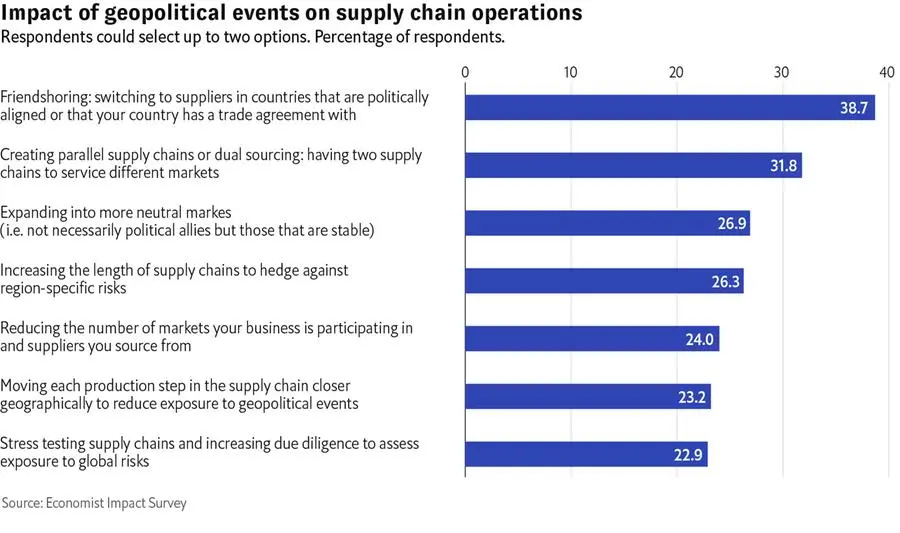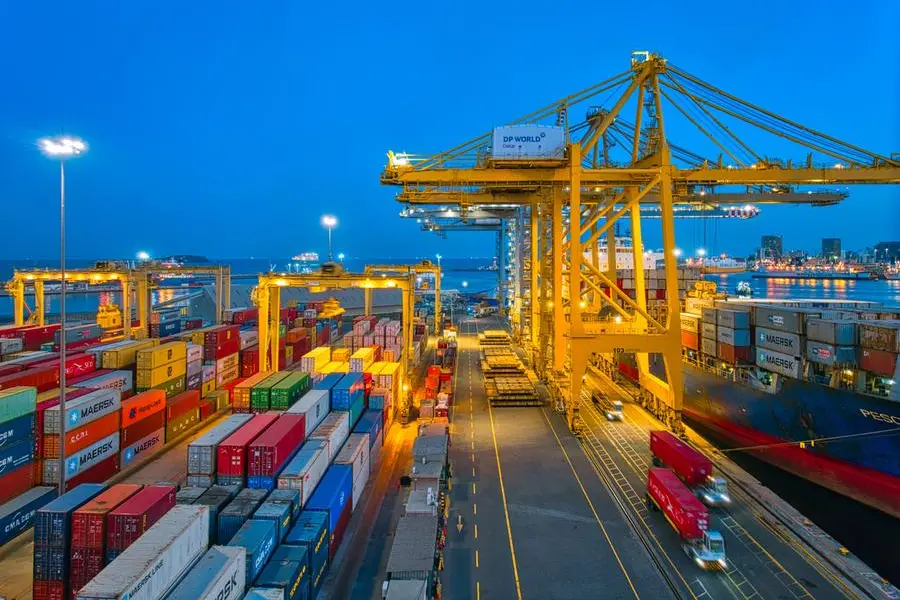PHOTO
- 39% are using friendshoring to shape trade and supply chain operations in response to current geopolitical events
- 35% of companies state government sanctions on key trade partners hinder their supply chain strategies
Davos, Switzerland: New research by Economist Impact and supported by DP World reveals that 46% of companies in the healthcare sector are using Artificial Intelligence (AI) to identify and address potential disruptions in their supply chains, underscoring the industry's commitment to adaptability and resilience.
The latest Trade in Transition study, commissioned by DP World and led by Economist Impact, captured the perspectives of trade experts and senior executives across a variety of regions and sectors. During a period of unprecedented transformation, heightened geopolitical risk, the urgent realities of climate change, and significant advancements in technologies are causing businesses to face complex challenges. Yet there are also opportunities. New technologies instil confidence and optimism to increase efficiency and visibility across supply chains.


Shaping healthcare supply chain operations amid geopolitical events
The healthcare industry, faced with the challenges of geopolitical events, is embracing strategies like friendshoring to shape trade and supply chain operations. A notable 39% of executives within the healthcare sector are actively rebuilding their supply chains with a focus on friendshoring in response to current geopolitical uncertainties. In addition, 23% of companies are working with fewer suppliers regardless of location, reducing the number of tiers or links within the company’s most critical supply chains. These approaches underscore the industry's resilience and adaptability in navigating complex global dynamics.
The main reason for optimism when thinking about the future of global trade over the next two years is new technologies that increase the efficiency and visibility of supply chains, stated by more than a third of companies surveyed. 44% of healthcare companies are using AI to optimise customer experience while 35% for forecasting demand. AI has also helped reduce overall costs of trade operations for 34% of healthcare companies and enabled better resource, supply chain planning and reduced disruptions for another 32%.
Concerns over economic uncertainty and government sanctions
The research also highlights prevalent concerns within the healthcare sector, with 30% of companies expressing worry about increased inflation and economic uncertainty leading to higher input costs. Additionally, more than a third (35%) of companies state that government sanctions on key trade partners hinder their supply chain strategies, emphasising the need for a comprehensive and adaptive approach to global trade in the healthcare industry.
Magrietha Mallinson, Global Vertical Lead, Health at DP World said: "In an era where unpredictability is the new constant, leveraging advanced technologies like AI is imperative. As production methods and pharmaceutical products continue to become more advanced, the industry must seek to innovate at every stage of the supply chain.
DP World recognises the costs and complexity associated with building healthcare supplies and pharmaceutical products and is committed to providing innovative solutions that align with the evolving needs of the healthcare industry. Our solutions are designed to alleviate the challenges faced by businesses in moving healthcare supplies, allowing them to focus on their core mission of delivering quality healthcare to those in need."
To view the full report, please click here.
About Economist Impact
Economist Impact combines the rigour of a think-tank with the creativity of a media brand to engage an influential global audience.
We partner with corporations, foundations, NGOs and governments across big themes including sustainability, health and the changing shape of globalisation to catalyse change and enable progress.
impact.economist.com
About Trade in Transition
This is the fourth edition of the Trade in Transition report commissioned by DP World and led by Economist Impact. It is a global survey that retrieves data from over 3,500 executives, examining private sector sentiment on international trade and supply chains. More specifically it looks at how factors such as geopolitics, climate change and technology impact trade and supply chains. Trade in Transition also looks into regional (North America, South America, Europe, Middle East, Africa, and Asia-Pacific) and sectoral data (FMCG, industrial, consumer goods, food-and-drink, energy-and-natural resources, health and pharma, and logistics and distribution) to compare and contrast priorities in international trade.
economistimpact.com/trade-in-transition/
For DP World media enquiries, please contact:
Adal Mirza
Group Vice President,
Media Relations
Adal.mirza@dpworld.com
Hakam Kherallah
Group Senior Manager,
International Media Relations & CEO Communications
Hakam.Kherallah@dpworld.com
Follow DP World on:
X (Twitter): https://twitter.com/DP_World
LinkedIn: https://www.linkedin.com/company/dp-world
About DP World
Trade is the lifeblood of the global economy, creating opportunities and improving the quality of life for people around the world. DP World exists to make the world’s trade flow better, changing what’s possible for the customers and communities we serve globally.
With a dedicated, diverse and professional team of more than 103,000 employees spanning 75 countries on six continents, DP World is pushing trade further and faster towards a seamless supply chain that’s fit for the future.
We’re rapidly transforming and integrating our businesses -- Ports and Terminals, Marine Services, Logistics and Technology – and uniting our global infrastructure with local expertise to create stronger, more efficient end-to-end supply chain solutions that can change the way the world trades.
What's more, we're reshaping the future by investing in innovation. From intelligent delivery systems to automated warehouse stacking, we’re at the cutting edge of disruptive technology, pushing the sector towards better ways to trade, minimising disruptions from the factory floor to the customer’s door.
WE MAKE TRADE FLOW
TO CHANGE WHAT'S POSSIBLE FOR EVERYONE




















